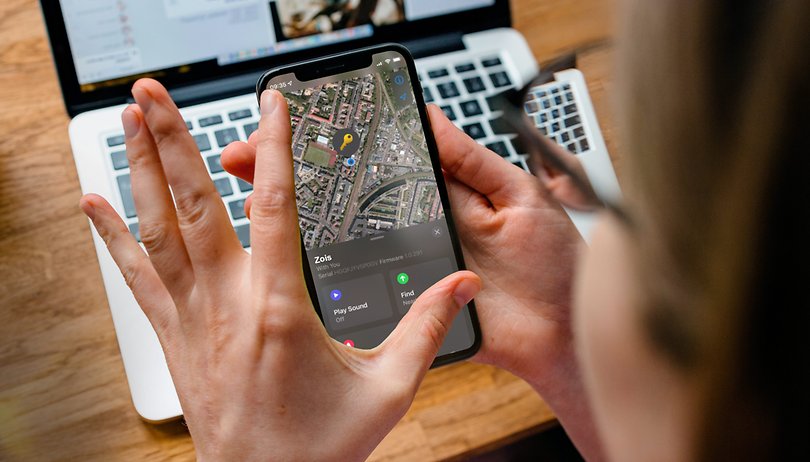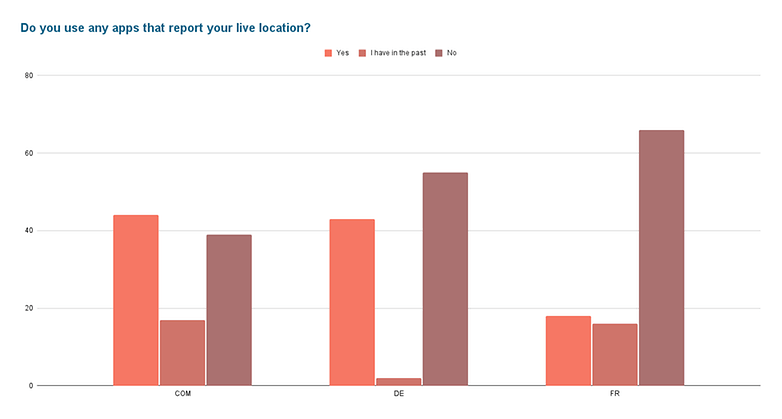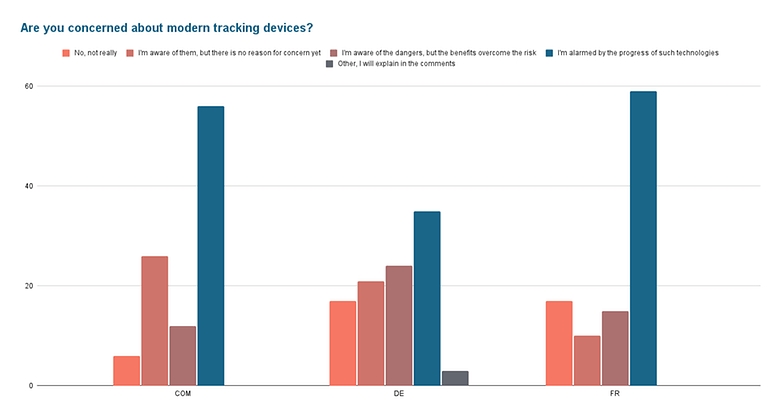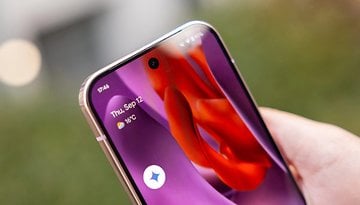Poll of the week: Are you worried of being tracked?


Read in other languages:
Last week, we asked you to share with us your concerns about the development of smart tag technologies and geo-location apps that make stalking easier than ever. Is our community paranoid or simply pragmatic about the dangers? Keep on reading to find out.
Looking at the results, it is clear that there is not a clear sentiment over those questions. For whatever worth they have, my expectations pointed to a clearer result with less skepticism of such tech. Apps that report our live location are simply everywhere, and the use case of smart tags is vast.
NextPit readers stay away from apps that report their live location
But, I was proven wrong. In our first question, "Do you use any apps that report your live location?" 44% answered positively and 39% negatively, with 17% admitting they had used them in the past. The answers were a bit more polarized in our German domain, with 43% and 55% answering negatively.

Our readers are very aware of their own privacy and security, and especially our French readers, only 18% use apps that report their live location, with 66% replying negatively. Even though the turnout in the French and International domains was low, our French readers were eager to share their concerns with tracking technologies and connect them with broader issues:
Whether we have a dedicated application or not, we are under surveillance. Spread the word!
Vince, French Domain
We are in a society of control, said Gilles Deleuze in the 70s.
With connected objects, it spreads even more easily but the origin of the problem is elsewhere. Whether it's the state, a company or the neighbor, it doesn't change anything, it's the state of mind of today's human (beings) that needs to change.louis hory, French Domain
I hope Louis will be happy to learn that NextPit readers are resistant to the normalization of surveillance. From this poll, it is clear that people are skeptical about the existence of such technologies, with answers showing consistent concerns across domains. 56% in the International domain and 59% in the French domain are alarmed by modern tracking devices. This is also in line with results in the German-speaking website, albeit more moderately at 35%.

Dissecting the German results further (that had the largest turnout) we see a healthy dose of skepticism. Even though, as we said, 43% of German readers use such applications, only 17% are worry-free, a sentiment shared with the French readers. Then we have an even spread of opinions, with 21% aware but not worried, and 24% concerned but still believing that the benefits are worth the risk.
With our International readers, we see a different sentiment. After those who are clearly alarmed and concerned, we have those who have heard of the risks but do not believe there is a risk for concern yet (26%).
Paranoid or just cautious?
So to conclude, we see that even though half of our readers use or have used applications that report your location live, most of them are either worried or alarmed. Now, I do not believe that this is an indicator of paranoia among our readers, but the danger of being stalked is quite real and you are very aware of how such technologies can be abused.
And as many pointed out in the comments; it is not just the immediate threat of being stalked but also the availability of such information to uncontrolled third parties and data breaches. Additionally, many of you wanted to express your frustration with companies themselves having access to your location data.
The combination and evaluation of various data from hardware providers and numerous second providers, which is then also shared with third-party providers, is worrying. It's not just the tracking, but all the resulting data and the increasingly violent AI possibilities to be able to evaluate more and more data better and better.
Olaf Gutrun, German Domain
I agree. Just the fact that devices can collect location information with such accuracy is concerning. Yes, this relationship with companies is covered by mutual agreements, privacy policies and a hefty amount of regulations (especially in the EU with the GDPR). But the occasional bad actor among them has the ability to both stalk and pose a more immediate threat. Here I am purposefully avoiding questions of "stalking" practices by the state, since this would probably fit better in an opinion piece.
Still, this is a risk that comes simply by the ability to track your location so accurately, since the first level of trust is between you and the device manufacturer, the app provider, and the regulators. This has been a threat for quite some time, but easily accessible consumer tech giving the ability to stalk easily and without traces is a whole new level of danger, and I am glad to see our community being alarmed by it.
But I believe that this is everything for today. Would you like to read an opinion piece on the normalization of surveillance? Do you think it is a problem? Thank you for taking part in this poll, and I'm hoping to see you again in the next one!
Original article:
It is true. I am the kind of person who tends to forget his wallet at an airport check, leaving my keys at a park bench, and my entire backpack with all my gadgets at the university library more than once. Hence, it makes perfect sense when I say that the idea of a wireless key tracker is an attractive proposition to me.
Over the years, many solutions have come to our rescue, with Samsung and Apple using some ingenious innovations to track our lost items securely. Take the AirTags as an example: it utilizes Apple's vast user base to "crowdsource" their location. If you leave an item with an AirTag attached to it and another user with an iOS device passes by, the location will be reported to an app known as Find My.
But recently, several instances of AirTags being used for stalking have been reported to the authorities. Apple has been trying to tackle the issue, reassuring that they are doing their best to ease safety concerns using software patches. Whether such solutions are enough is a topic for another day. The truth is, stalking seems to be on the rise recently, And modern technology plays a big role in enabling such behaviors.
Are you worried about modern stalking methods?
Stalking is not a new practice. The image of someone waiting in the bushes with a pair of binoculars lurking in the background as the primary antagonist has somewhat been romanticized in popular media. It is a major issue that comes as the other side of the coin where modern tech is concerned, is how it is ever-present in daily applications.
Snap Map, for example, is a live map feature that reports your last recorded location to your friends through the popular messaging platform Snapchat.
The popular gay dating app Grindr (or bisexual or bicurious) is another platform where stalking takes place and can be a bit more dangerous since other users in your area can see your distance right down to the exact meter, and you cannot be selective about it. Without further ado, here is the first question in our poll of the week:
As fun as it may be to locate your friends for a quick chat, such services come with the risk that someone finds out your location with possibly uncomfortable outcomes, even if there is no malicious intent or an actual confrontation.
But I am curious about how are tech-savvy NextPitters tackle such issues. How do you feel about the progress of tracking devices and services that are widely available?
If you ask me, it is all about control. I can control who sees my Instagram and Snapchat stories, but with the development of crowdsourced geolocation tech, I cannot help but be alarmed: I simply cannot know if I am being stalked.
Apple's solutions do little to help me feel safer. Downloading an app that checks whether there is a foreign AirTag around arouses suspicion of one being tracked, which may be a little bit too late.
When it comes to solutions, I cannot see one for commercial trackers apart from a complete ban. What about you? Do you agree with that? Or is there a solution to the tracker problem that I've missed out on? Let me know in the comments!



















